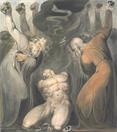Emor 5774 – Don’t Use God’s Name as a Weapon
 And the son of an Israelite woman, whose father was an Egyptian, went out among the people of Israel; and this son of the Israelite woman and a man of Israel strove together in the camp; And the Israelite woman’s son blasphemed the name of the Lord, and cursed. …Leviticus 25:10-11
And the son of an Israelite woman, whose father was an Egyptian, went out among the people of Israel; and this son of the Israelite woman and a man of Israel strove together in the camp; And the Israelite woman’s son blasphemed the name of the Lord, and cursed. …Leviticus 25:10-11
God does not want us using Her name as a weapon.
This week’s Torah reading, Emor, brings the story of a “son of an Israelite woman” who gets into a fight with a “man of Israel,” who “blasphemed the name of the Lord” and cursed. Moses didn’t know what to do, so they put the guy in custody while Moses asks God. God tells Moses “Bring forth him who has cursed outside the camp; and let all who heard him lay their hands upon his head, and let all the congregation stone him.”
Naturally, we find it troubling that blasphemy would be a capital offence. The rabbis of the Talmud also had a lot of questions on the subject (see Sanhedrin 56a). The word translated as “blasphemed,” vayikov, is not a simple word. The rabbis came up with three interpretations of the meaning of the word (note that in some verb forms in Hebrews the “y” (yud) and “n” (nun) are substituted for each other).
- Cursed – as we get from the same “root” word used in Numbers 23:8 when Bilaam tells Balak “How can I curse (ekov) someone God has not cursed?”
- Explicitly pronouncing the holy four-letter name of God, the tetragrammaton, which we pronounce in our prayers as “Adonai” (“Lord”). Only the high priest could say the name the way it is actually written, and he could only say it on Yom Kippur in the holy of the holies in the Temple. This is derived from another similar seeming word, nikevu, in Numbers 1:17, “And Moses and Aaron took these men which are expressed (nikevu) by their names;
- Pierced – the “normal” every day meaning of the root word, as demonstrated with a verse from 2 Kings, “So Jehoiada the priest took a chest, and bored (vayikov) a hole in the lid of it.”
A d’var Torah from Dr Moshe Meir (in Hebrew) connects the three uses of the word. The everyday use of the word, to pierce, make a hole, can connote harming someone – as in running them through with a spear – or using it, making a hole so that you can get something inside out, or put something that outside inside. Using God’s name then is “piercing” through to God – getting God’s attention, just like if someone calls out your name, you look up to see who called you. It “pierces” the veil of your inattention.
But breaking the boundary between God and Man is not something we are supposed to do – there are examples in the Torah, such as when the people are commanded not to approach too close to God at Mt Sinai. God’s holy name is so powerful only one man was allowed to say it on one day of the year in one place. It was forbidden to all others. In this case, why did the blasphemer use God’s name? He was hoping to “pierce” through to God, to arouse God’s powers with a curse against the other guy. He wanted to kill someone using God’s name.
And the message here is God does not want us to do that. God does not want us harming others with God’s name – so it is completely prohibited to use God’s name in that way, no matter how just the cause. It’s so powerful it’s like an atomic weapon, you may have it, but don’t dare unleash those forces.
This applies equally everyone. Suicide bombers who shout “Allah huakbar” as they blow themselves are violating this prohibition, and Sarah Palin, who recently said she considered waterboarding, a form of torture, the “way we baptize terrorists” is also guilty of this. Don’t bring God into your fights. Don’t try and arouse God to fight on your side by invoking His holy name. Don’t abuse God’s holy name to injure others – not Jews, not Muslims, not gays, not heathens, not anyone.

